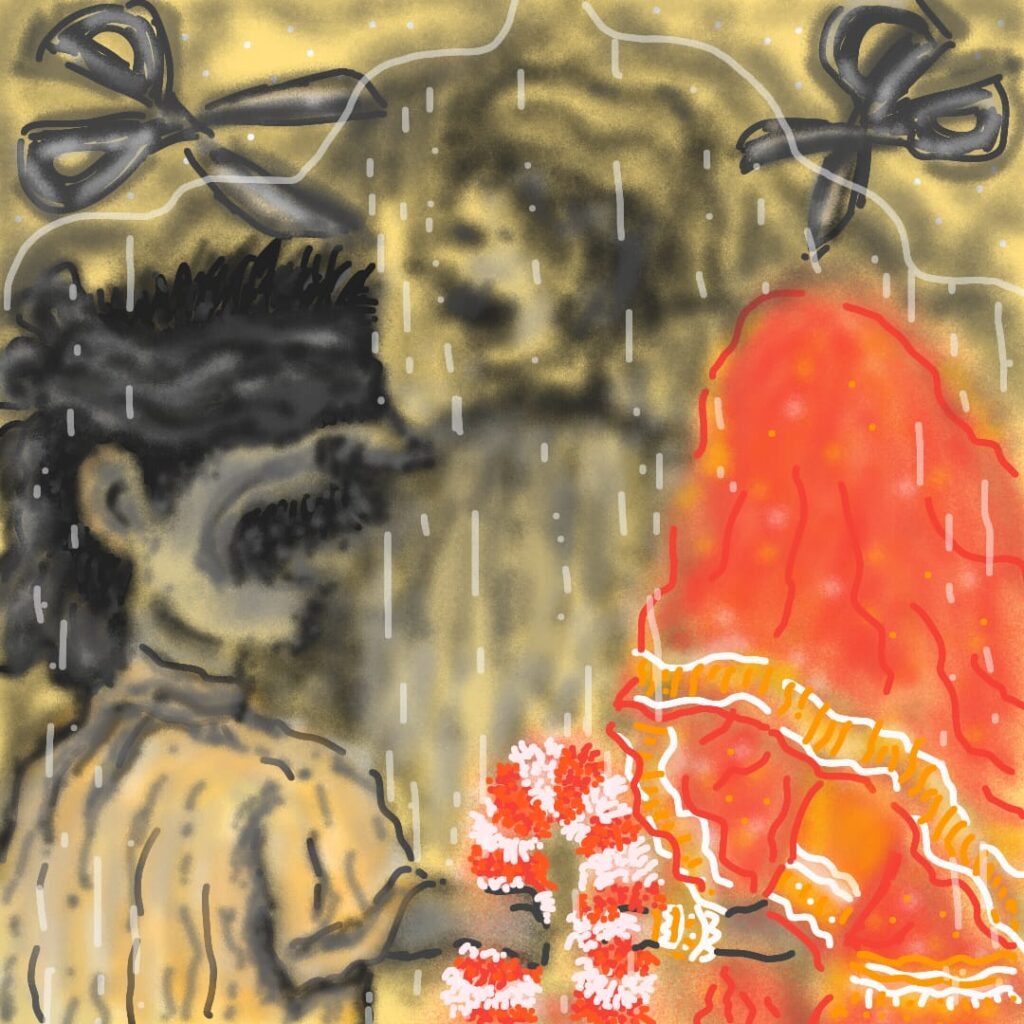
THERE ONCE LIVED a farmer and a barber who were very good friends. One day it became time for both of them to marry. It was customary in this area to go through a betrothal ceremony. Afterwards the prospective bridegroom would pay a special visit to his fiancée’s home. When both weddings had been arranged, the farmer said to his friend, “Why don’t you go to the home of your bride-to-be and see what the girl is like.” So the barber set off. When he arrived at his bride’s home he found his betrothed standing at the door buying spinach from a passing merchant. Some hours later the barber was offered this spinach as the main dish of a ceremonial meal. Needless to say, he was disappointed with the lack of more prestigious and festive foods.
The next day the barber decided to visit his farmer friend’s new in-laws. When he arrived he found that fiancée standing on the doorstep as well. This girl, however, retreated into her house and hid as soon as she saw a friend of the groom approaching. Furthermore, in this second house the barber was served delicious festival foods. He kept quiet, but secretly he thought to himself, “My bride is a bad woman because she fed me tasteless spinach. But my friend’s bride is good. She gave me delicious foods like puris and kachauris.” The barber was disturbed at his discovery and wished to hide these things from his farmer friend. So he said to his friend, “Listen! My bride is a fine woman. In my own in-laws house I ate puris and kachauris. But your new bride is bad-at her place I was offered only spinach.” The farmer responded by thinking, “My wife must be very bad!” When it came time for the wedding, the farmer decided to cover his eyes. He asked his mother and father to buy him four kinds of cloth and he blind- folded himself with these just before the consummation of the wedding was celebrated. Indeed, he made this a condition of going through the ceremonies at all. The farmer remained blind- folded through all the rituals. He also refused to eat anything but bread.
Now this farmer and the barber had established a habit of playing a gambling game in the farmer’s garden. One day, soon after their weddings, they began to play again as usual. But the farmer’s new bride soon said to her mother-in-law, “Today, mother-in-law, I wish to see the garden!” So the new bride hired a special palanquin and with much ceremony and pomp she was taken to see the garden. When she found the two friends gambling she said to them, “Oh! I wish to play this game too.” At this very moment the barber had to leave in order to use the washroom. Meanwhile, the farmer was, of course, not blindfolded. So upon seeing the face of such a lovely woman he was enchanted, and he invited her to come and sit beside him. She then said, “If you can find a way to send this barber off, I will agree to play a gambling game with you.” So the farmer found a way to send the barber on a four-day trip. He then wagered his ring in a gambling game with the girl. After a while she won the game and got up to go. The farmer invited her to return for another game the next morning. The young girl replied, “Either I or my sister will come.” The farmer insisted on her presence, however, saying, “No, you must come.” After she had left, the farmer rebound his eyes and went home to eat.
On the second day the young bride again arrived in order to play a gambling game with her husband. On arriving she said, “Let’s play again.” The farmer agreed and this time he wagered his bracelet. The young girl also won the second game, and when she left she took the bracelet with her. In the same way the couple met again in the garden on the third day. This time the farmer wagered a garland. The girl won this as well and left the garden carrying it with her. On the fourth day the same events were repeated. This time the farmer wagered his necklace, and again the girl won and took this away. The farmer continued to invite her to join him and the young girl began to go daily to the garden. Finally she had won everything the farmer owned. When he had nothing left, he went home and said to his mother, “Mother! Please prepare food for several days. I am going on a trip in order to look for something.” The mother then took various things which her daughter-in-law had won from the farmer and put them inside a special sweet. She made several of these sweets, called “laddus,” and told her son, “The little laddus are for the barber and the bigger ones are for you.”
The barber and the farmer then left on their trip. Soon, however, the farmer turned to the barber and asked him “Where is the village named Here and There?” The barber replied, “Brother, don’t be silly. There is no village called Here and There.” Then the two sat down to eat and the farmer broke open his laddus. In one he found the ring he had gambled. In the second he found his necklace. In the third he found the garland, and in the fourth his bracelet. The farmer was very astonished and he quickly ran back home. The barber begged him to stop but the farmer would not stop. When he arrived home he found his wife dressed in torn clothes, baking bread. He at once began to laugh and said to her, “You have deceived me very successfully.” She replied, “You made me very sad. You bound your eyes and ate only bread, refusing to even look at my face.” In this way the farmer learned that his barber friend had lied to him. Now he began to live happily with his wife.
Source: Folktales of India by Praphulladatta Goswami, and Jawaharlal Handoo
Illustration: Amrapali Das

